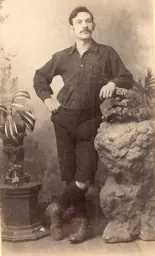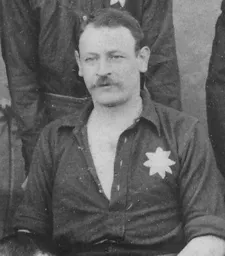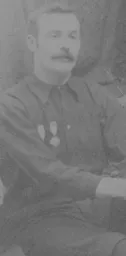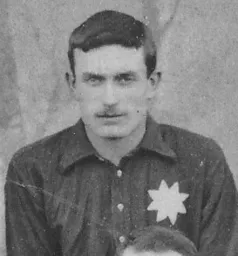The Luton Reporter -
“The English Cup. Luton Town v Windsor Phoenix. These teams met on Saturday on the Athletic Ground in the second round of the English cup qualifying competition. The visitors had not been engaged in the first round, a bye falling to their share, whereas the Town had disposed of Swindon Town after a hard fight by four goals to three. The Phoenix had in the previous week given some indication of their quality by administering a nine to nothing beating to the Second Life Guards. Although they had not previous met the Luton cracks the local spectators were perfectly familiar with their form, for they appeared here twice last season in the concluding rounds of the Luton Cup. On the first occasion they met Wolverton in the semi-final and defeated them by two goals to nil, while in the final they were beaten by Kettering by five to one. Their team had changed considerably in its constitution since that time. It had been greatly strengthened by the inclusion of three of the 93rd highlanders’ players, and the backs, who rendered themselves particularly noticeable in the early part of the year by their brilliant defence, were still found donning the light and dark blue. The home team was exactly the same as eliminated Swindon. It was somewhat later than the advertised time when the elevens took up their positions in the following order:- Luton Town : J. Burley, goal; A. Sanders and J. Hoy, backs; J. Wright, H. Paul and A.H. Taylor, half-backs; H.W. Oclee (centre), F. Whitby, G. Deacon (right), W. Cheshire and H. Whitby Left) forwards. Windsor Phoenix: J. May, goal; A.W. Brown and H.C.F. Davenport, backs; C. Thompson, O. McCloskie and H. Barton, half-backs; J. Dudson (centre), J.J. Earl, H. Hackshaw (right), J. Emery and C. Barker (left) forwards. The home team won the choice of positions and elected to defend the Dallow-lane goal. It was about 3 o’clock when Dudson kicked off before about 2,000 spectators. The sun was shining very brightly, and this somewhat incommoded the Phoenix, who were playing in the full glare. Luton went off with a rush and in a few seconds the leather was found in close proximity to the opposition goal. The home players failed to score, however, and Davenport kicked away. A grand run and some excellent passing by the Luton left wing almost resulted in a score. The ball was admirably centred from a “corner” directly afterwards, and Paul headed it in. A point was claimed, but although it had apparently passed through by a foot before the goal-keeper stopped it, the referee declined to allow the notch on the ground that he could not see. After two or three more brilliant rushes by the Town forwards, who were showing very fine form, the visitors retaliated and things looked ominous when “hands” against the “blues” relieved the pressure. The game thereafter continued fairly even for a space, but at length the “royal borough” men visited their adversaries quarters and obtained a “corner” off Hoy. This was not improved upon, and by means of some very fine “heading” the Lutonians managed to transfer the scene of operations to the other end. “Hands” fell to them about a dozen yards from the uprights and they strenuously endeavoured to obtain first blood, but they were unable to baffle the vigilance of May. The next noteworthy incident was a laughable one. One of the visiting forwards obtained possession from a good pass by the back division, and though the referee immediately whistled to denote that he had infringed the “off-side” rule he persisted in finishing his run by kicking the ball past Burley. The referee, of course, promptly disallowed the claim for a goal. Paul was rendering himself very conspicuous just now; he was doing a great amount of work, and it did not seem to trouble him how the ball came, for he was equally ready with his head and feet. In the course of some determined assaults on the Windsor fortress H. Whitby and Deacon became noticeable, both dribbling and passing exceedingly well. A fine shot from the right wing should have scored, and May only averted the disaster by steering the leather behind the line. Sanders, who had been showing stubborn defence, executed a particularly brilliant manoeuvre just afterwards. The opposition forwards had managed to get past him and his companion and it seemed that the downfall of the Luton stronghold was imminent, when he rushed back and managed to deprive his enemies and send the leather down the field. The front division at once assailed May’s charge and Oclee kicked over the cross-bar. The sphere was returned directly afterwards, however, and Harry Whitby opened the Luton score with a grand shot from a pass by Oclee. From this stage until the interval arrived the play was pretty much confined to the Windsor boundaries. The Lutonians seemed to exert themselves more strenuously, and more than once they came within an ace of scoring. Deacon on one occasion sent in a very warm shot after a pleasing exhibition of combined tactics, and it was only by the skin of his teeth that may was enabled to preserve his charge. Just before the whistle sounded, the home forwards brought about a “corner” from a scrimmage in front of the Phoenix goal, but the kick-in was ineffective. At half-time the score was: Luton, one; Windsor none. The adverse conditions which the “reds” had to contend against in the second portion did not seem to diminish their determination in the slightest degree, for though the sun was shining brightly in their faces they still continued to press. Their opponents, on the contrary, seemed to be somewhat deprived of their energy, their weight telling on them in the fast play which had been witnessed. For a space the Luton partisans had an anxious time, the leather been taken uncomfortably close to their citadel, but it was not for long. The forwards were too smart for their foemens’ back division, and time after time they put in some grand bursts. One of the most noticeable of these was a good display by F. Whitby and Deacon, and disaster to the Windsor side was only staved off by the leather being headed over the bar. Hard luck continued to be experienced by the Town men, and it was only by the merest chance that they failed on several occasions to increase their total. Another laughable incident occurred at this period. “Offside” was given against the visitors, but despite this their centre forward persisted in finishing his run. Deacon’s fearless tackling continued to be remarked upon, and by his plucky tactics he managed to baffle Brown on several occasions. Burley, who had hitherto been troubled very little, was next afforded an opportunity of displaying his dexterity, and he acquitted himself as satisfactorily as ever. The ball was well shot in and the Luton custodian fell with it, but by a combination of good luck and excellent judgment he managed to get rid of it. Immediately afterwards a magnificent try was made from the visitors’ right wing; the ball came in at high speed, but Burley knocked it many yards from his charge. Very shortly afterwards the local representatives increased their lead through the agency of Deacon, who sent in a fast, low shot which it would have puzzled the best of keepers to stop. Luton had now quite outplayed their adversaries, but they still played an open game and did not fall back upon defensive tactics. Their courage was amply rewarded, for just before the finish Cheshire scored in splendid style. When time had expired the “reds” had qualified for the third round by three notches to nil. The whole of the members of the home team showed good form, and the short passing by the forwards was a considerable improvement upon their previous displays. They won on their merits, and are deserving of hearty commendation. The opposition forwards were the weakest portion of the team, and had it not been for the steadiness with which Davenport and Brown resisted the determined rushes of the Lutonians the score of the winners would have been much larger. The referee was Mr C. Squires (City Ramblers), and the linemen were Messrs A.J. Smith (Luton) and W.B. Hill (Windsor).












